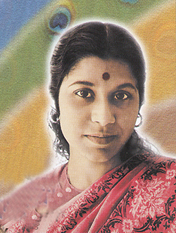|
Sabita Chowdhury

Although
Salil used Lata to revolutionize the Bengali Modern Songs with unforgettable songs
like 'Na Jeo na', 'Jaa re, ja re uDe ja re paakhi', 'Ogo aar kichhu to naai' and
other songs, Sabita's role was also phenomenal. I think her first recorded basic
song was a Salil song 'Mori haay go haay', a beautiful song and one of my most
favourite Salil songs. Sabita recorded this song in 1958 along with 'Surero ei
jhar jharna'. However, with 'Ene de enede jhoomka' she really burst into the scene
and became a much loved singer in Bengal. She was a perfect match for Salil and
became an expert in 'Salil-Sangeet'. In fact Sabita has recorded most number of
songs for Salil. Sabita did playback singing for several Hindi and Bengali films
(not Salil) before she even recorded her first song for Salil. Her second recorded
song was composed by Nochiketa Ghosh. In fact Nochiketa Ghosh composed two songs
for Sabita. Salil wrote the lyric for one and Pulak Bandopadhaay for the other.
Other music directors such as Sudhin Dasgupta also composed songs for Sabita (Lyrics
and Music by Sudhin Dasgupta). Salil used Sabita for his Hindi, Malayalam, Kannada,
Tamil, Assameese and Oriya songs as well !
* "Oi jhilmil jhauer boney" was also performed for the AIR. It was the 'Song of
the Month' in 1977. Sabita also performed the song "Miti miti taaraaraa" for the AIR.
*
"Sudhu tomaari jonne" was originally recorded by Manas Mukherjee. Sabita sang it
for the AIR. I don't know the year. I have a wonderful recording of Salil
himself singing this song just after he composed it.There are three different
Bengali versions of this song !
*
Salil used the song "jaare jaa jaa mono paakhi" in the Title music of the Malayalam Film 'Ezhuraathrikal'.
This was released on a 78rpm record. Salil used this Title music to compose
the hindi song "Hamraahi manzil ke" in the film "Anokhaa
Daan" and surprisingly also for the children's film "Jawaab aayega" !
* "Holud gaandaar phool" was Sabita's first AIR song which became very popular and so did Sabita.
"Koto ritu aasey jaay" was recorded at Salil's own studio with full orchestra and was
broadcast at the AIR. I don't know which year though. Wonderful song...
"Naa naa naa jeonaa jeonaa chole" and "Kano e mon amon kamon karey" were performed at the All India Radio, Calcutta. I
don't know the year.
"tumi ki kakhono sei gaan sono" has three sets of lyrics ! The original version 'Guru guru
guru' was performed by Sandhya Mukherjee for the AIR ( I don't know the
year) .The Sabita version mentioned here is the second one with
different lyrics and finally Lata recorded it yet again ("sabaar adaaley saanjh sakaale") in 1988 with another
set of lyrics. I wondered if Salil kept forgetting the original lyrics
or was it because he liked this song so much ! I still consider the Mukesh
version 'Nain hamaare'
in the film Annadata as the best.
* Sabita performed
the song "Aaj sorote aalor baanshi baajlo" first for the AIR with quite different lyrics than the later
recorded version.
* "Naao gaan bhorey naao" is in fact a duet by Antara and Sabita.
This song was originally recorded by Protima Bandyopadhaay back in 1955
which has different lyrics. It has the same introduction but the second
stanza (antara) has a different melody.
* "Jhilmil jhilmil opaarero monjil" was also performed by Sabita for AIR in the early or mid '60s with different lyrics.
*
It seems we were not aware of this song "O saghana saghana" ever being recorded ! It was suddenly released by Megaphone after the owner died and long after Salilda passed away. Apparently this song was recorded in around 1981 and Salilda decided not to release it for some unknown reason. The original beautiful Assameese version "O kapou pahi" by Sabita was recorded sometimes in the '70s.
*
"Tomaar buker khuner chinho khunji" was originally recorded in 1948 by Sunil Mukherjee. It was composed
by Salil just after the death of his close friend the poet Sukanta Bhattyacharya
who died of tuberculosis and without any treatment. The record is not
available anymore.
*
"Du chokhey aashaar nodi chhalachhal" was performed for the AIR and was 'Song of the Month' in 1987.
|

